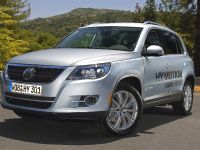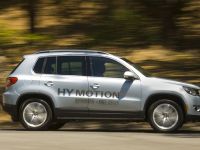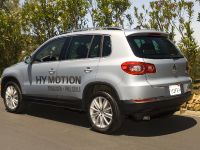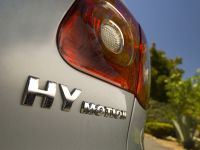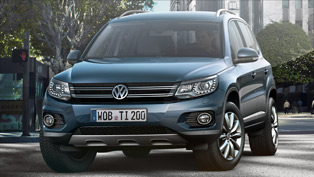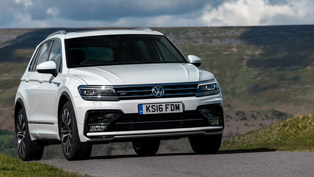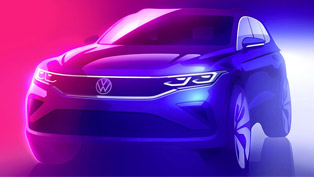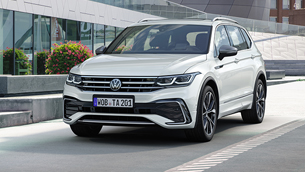Volkswagen’s U.S. Debut of Zero Emission Tiguan
Volkswagen of America, Inc. is showcasing its broad range of near-term and future fuel-efficient powertrain technologies with the all-new 2.0 liter TSI Tiguan, the upcoming 2.0 liter Jetta TDI and the North American debut of the Tiguan HyMotion Fuel Cell Concept.
Originally shown at the Shanghai Motor Show and the 2007 Michelin Challenge Bibendum, the Tiguan HyMotion highlights the current state of Volkswagen's hydrogen fuel cell research and development. The Tiguan HyMotion features a hydrogen fuel cell system, which provides over 107 horsepower and produces zero tailpipe emissions (clean water vapor is its only bi-product). The innovative new Tiguan builds upon Volkswagen's ongoing development of the fuel cell as previously demonstrated with the Touran HyMotion.
Volkswagen has long been committed to fuel efficient, environmentally responsible vehicles and this is evident with the new Tiguan utility vehicle and the Jetta TDI, offered in both sedan and SportWagen body styles. These vehicles provide efficiency, utility and performance in the refinement and interior appointment that is the hallmark of all Volkswagen vehicles. The well-refined four cylinder turbocharged engines – the Jetta utilizing Volkswagen's TDI technology and the Tiguan the fuel efficient TSI – provide ample horsepower and prodigious torque to make these vehicles sporty, efficient and fun to drive.
Tiguan HyMotion
The Tiguan HyMotion concept features a fuel cell system integrated in the engine compartment capable of 107 horsepower. With an assist from the electric motor, the Tiguan HyMotion advances to 134 horsepower. The top speed of the Tiguan HyMotion is 93 mph and it accelerates from 0 to 60 mph in about 14 seconds.
A lithium ion battery with a charge capacity of 6.8 Ampere-hours (Ah) serves as an auxiliary energy storage device with a maximum power output of 22 kW. The battery is charged by recovered braking energy (recuperation) or by the fuel cell. This increased functionality and efficiency does not impair the interior space of the vehicle. The battery system is installed in the trunk beneath the dual cargo floor available on the production Tiguan. The 700 bar hydrogen tank was integrated in the area beneath the floor in the rear bench seat and cargo area. It can hold up to 3.2 kilograms of hydrogen (H2).
Basic operation of fuel cells
The key component of each individual fuel cell – a number of them are combined into a stack – is a proton-conducting membrane. It is located between each anode and cathode pair. Hydrogen flows on the anode side, and air flows into the cell on the cathode side. When many of these cells are combined in a stack, enough energy can be generated to drive a vehicle.
In each cell, hydrogen and oxygen react to form water on the cathode side. The fuel cell thereby converts chemical energy directly into electrical energy in an oxidation, or "cold" combustion process. The generated "exhaust" is clean water vapor.
The fuel cell is supplied fuel from the hydrogen tank and oxygen from the air by an external air inlet and outputs the electrical energy it generates – the power – via a converter and a downstream electrical system rectifier – to one or more electric motors. The Tiguan HyMotion is nearly silent when driven, and it is emissions-free.
Current Fuel Efficient Vehicles
Fuel efficiency, performance and convenience all come standard with the 2009 Jetta TDI sedan and SportWagen. The eagerly anticipated, 50-state compliant clean diesel TDI's come to the United States in August 2008.
The Jetta TDI will have an immediate impact on fuel savings in a big way – up to 35 percent savings compared to a similar gasoline engines. The Environmental Protection Agency estimates the Jetta TDI at an economical 29 mpg City and 40 mpg Highway.
Volkswagen engineers have been able to reduce NOx emissions by 90 percent on the TDI engine, through internal engine modifications and new catalytic converter technologies. This advance in diesel technology allows the Jetta TDI to exceed the toughest emissions requirements, including the "LEV2" standard, which limits NOx emissions to 70 mg per mile.
The new Tiguan comes standard with a 2.0L TSI engine delivering turbocharged acceleration while maintaining responsible fuel efficiency of 18 mpg in the city and 25 mpg on the highway. This award winning turbocharged four-cylinder power plant delivers 200 horsepower and 207 lbs –ft of torque. The combination of four valves per cylinder, direct fuel injection and turbo charging delivers the optimum balance of power and economy. Adding to increased efficiency is a choice of either six-speed automatic or six-speed manual transmission options.

